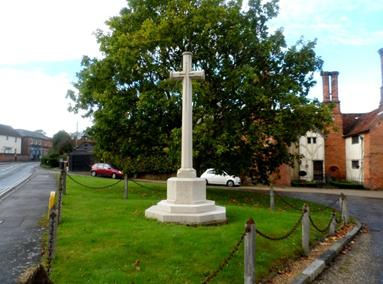
Percy Gordon
BROWN
1898 -1918

Early Life
PERCY GORDON BROWN was born in the spring of 1898, the youngest son of six children of Arthur and Alice Mary Brown (née Snow).
His parents were married early in 1887 in St George’s, Hanover Square, Westminster, Middlesex (now London). Both Arthur and Alice were born in Great Waltham. Their first child, Ethel Mary was born in June 1887 and died two months later in August.

BAPTISM PERCY GORDON BROWN AT GREAT WALTHAM CHURCH

THE BROWN FAMILY INSIDE THE POST OFFICE GARDEN (abt 1902-3)
(L-R) Elsie Maude b. 1896, Herbert Snow (standing) b.1891, Arthur William (Archie) b.1889, Arthur (father), Percy Gordon seated next to his mother Alice and Ethel May, b.1894.

In the 1891 Census, the family with one child Arthur William were living at the Village Post Office.
By 1901 the Census shows the family had grown with now five children all living at Church End in the village, with Percy the youngest, aged 3 years.
In 1911 the Census shows Arthur, a Postmaster and Grocer and Alice, the postmistress with Ethel, and apprentice Milliner and Percy, a schoolboy at the Guildhall.
Military Life
Percy enlisted as a Private, in the 3rd Battalion, 6th Essex Regiment, Regimental No. 6141. He transferred prior to March 1917 as Regimental No. 5575, to the Border Regiment, 2nd Battalion and was renumbered as Regimental No. 27490. (20th Brigade in the 7th Division.)
The 2nd Battalion fought on the Western Front from October 1914.
In November 1917 the Brigade, was assigned to the Montello sector and from January to October 1918 served with the 7th Division, on the Italian Front where they remained until 1919, when they went to Ireland. It had for some time been decided that the British troops should, during the summer months, occupy some portion of the mountain sector. The exact front selected was that lying between Asiago and Canove. In June, there was torrential rain and flooding which washed away some of the enemy’s bridges and with constant bombing the enemy was pushed back both on the Piave and the mountain front. As a result the front line was re-established and the Austrians were defeated.
Death and Memorial
On the 26th August 1918, aged 20 years, according to the UK Army Soldiers’ Effects, Percy died from an ‘aneurism’ in Italy. It is also recorded he died from disease, which may have caused the aneurysm.
Percy is buried in the Dueville Communal Cemetery Extension. Plot 1. Row F. Grave 4. His headstone reads -
“In Thy Gracious Keeping
Leave We Now
Our Dear One Sleeping”

Dueville is a commune in the Province of Vicenza, 12 kilometres north of the town of Vicenza, in Italy. From April 1918 to the early months of 1919, the 9th, 24th and 39th Casualty Clearing Stations occupied the village school at Dueville and used the extension to the communal cemetery for the burial of those who died of wounds or disease. The Allied front on the Asiago Plateau was about 22 kilometres distant; the Piave front, to which the XIVth Corps was moved for the final attack on the Austrian positions in October 1918, was about 64 kilometres from the village.

DUEVILLE COMMUNAL CEMETERY EXTENSION

Percy is remembered in his home village on the Great Waltham War Memorial.


UK, Army Registers of Soldiers' Effects, 1901-1929
On the 31st October 1918 his mother, Alice as next of kin received £17.5s. and on the 15th December 1919 a further Gratuity payment of £10.10s. was paid to her.


MEDAL CARD

